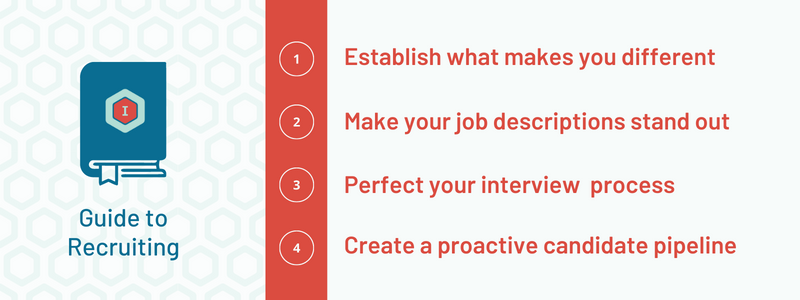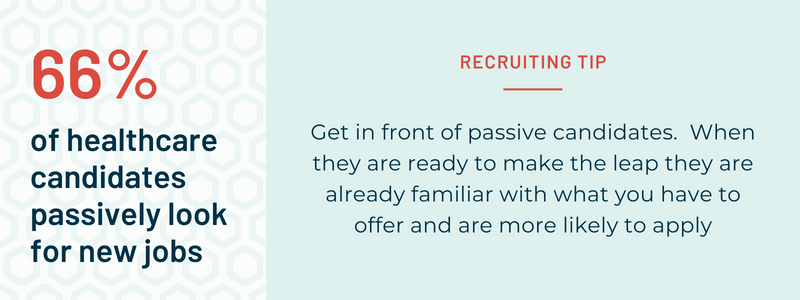Nov 02, 2022

What Makes Your Facility Different?
It’s easy to assume candidates will want to work at your healthcare facility. If you love your employer, why wouldn’t potential candidates feel the same? However, in today’s competitive market, you can’t settle for an average first impression.
Let’s first consider how you view physicians’ CVs. Generally you’ll see education, experience, and licenses / certifications. So how do you choose between them? It’s the stand-out features that help you choose one over the rest. Much like choosing the perfect candidate, providers are comparing your job listing against others to find the most desirable features.
So, what is unique about your hospital? Your facility and job descriptions likely include phrases like “mission-minded” and “helping underserved communities.” While these are important to include, do they help you stand out?
Compare, Critique, Then Improve
The first step is getting to know your competition. If you’re currently searching for a family medicine physician, search the web for “family medicine physician jobs.” Read through the job listings and compare them to what you’ve written for your own listings.
Do you see a lot of the same selling points? Remember, it isn’t bad if there are a few similarities. This simply means you need to add in some differentiators. As you read through the job descriptions, look for ways other facilities try to stand out. Does your facility have something similar or better to offer? The key here is to do thorough research and be honest with yourself.
Once you’ve done the research and taken notes, it’s time to improve. At this stage, you’ll want to brainstorm with members of your team. This brainstorming exercise will help you put into words what makes your facility unique.
Attention-Grabbing Job Descriptions
Now that you have an eye-grabbing corporate description, it’s time to take a look at the actual job listing. Or, more importantly, the benefits and features you list for your job description. Two pieces take precedence here: location and salary.
Ask any one of our recruiters what candidates care about, and during the last 15 years the answer has generally stayed the same: location, salary, and schedule are the most important factors considered when switching employers.
Location
Even if a candidate doesn’t live down the street from the facility they work in, they’ll still be spending a lot of time in that neighborhood. So, it’s up to you to show them why they should want to work in that location. Keep in mind, it isn’t about making your location sound lavish and trendy—it’s about showing candidates what makes your location stand out.
For example, if you’re an FQHC located in a neighborhood with a high homeless population, you probably tell candidates about the difference they can make by providing healthcare to those in need. But don’t just tell them. Show them. Do you have statistics showcasing how your facility has improved the overall health of the community? Or perhaps you have a glowing review from a patient who was treated at your facility. This is your chance to tell a story and create a powerful image.
Salary
Old habits die hard and long gone are the days of withholding salary during the screening process. Candidates demand salary transparency and if you’re withholding this information, you’re losing out on a large portion of the candidate pool.
First and foremost, multiple trusted websites allow employees to list an employer's salary based on job title. Even if you don’t include salary in a job description, they can find out. However, by forcing candidates to find this information online, you lose control of the conversation. Most employers avoid posting pay information for one of two reasons: to keep it hidden from current employees or simply because it isn’t as high as other jobs.
Whatever the reason, you still have options. Consider using a salary range that’s commensurate with experience. Even if it’s a broad range, it provides candidates with a general idea of what to expect. If the salary is lower than those at other facilities, you can include other selling points alongside the salary. These include loan repayment options or a low cost-of-living based on location.
In today’s economy, salary is important. If you go through the interview process, only to have a candidate pull their application because of salary, you’ve wasted valuable time that could’ve been spent wooing other candidates. Salary transparency benefits everyone.
Positive Interview Experience
A fine-tuned interview process not only helps you hire a great candidate for a current opening—it helps you find more in the future. Whether or not they get the job, candidates are more likely to refer an employer to a colleague if they had a positive interview experience.
So how do you create a good reputation among healthcare providers? Communication. More than anything, candidates want to know their status throughout the application / interview process. Even if a candidate isn’t a good fit for your job, they’ll appreciate knowing if they’ve been taken out of the running.
At Inline, our recruiters place communication at the top of their priorities when connecting providers with healthcare facilities. We know how hard it is to find the perfect candidate, so we make a point to keep them updated and informed throughout the entire process. Consistent communication helped one of our clients hire a nurse practitioner that received multiple job offers:
“I had other offers, which I almost accepted when the hiring manager did not reach out to me for an interview in time. But Inline saved the day by reaching out to them and informing me that the job was still available after contacting them on my behalf. I was eventually interviewed and accepted their offer as this was the best fit.”
The bottom line? Lack of communication can lead to missing out on top candidates. We recommend scheduling calendar reminders to follow up with providers weekly and let them know where they are in the process.
Getting to Know Candidates During Interviews
It’s important to dive deep with a provider during the interview process. Not only does this make a good impression on the candidate, but it also sets you up to make the best possible hire. What do you learn about an interviewee’s family? If relocating with a spouse, it’s likely important for a physician that their spouse can also find work in the community. Do they have children? The candidate may want to know local school rankings. While you wouldn’t ask these questions outright, have this information on hand so you have an answer if the candidate brings it up.
Additionally, when a provider comes in for a facility tour, you can then show them around the neighborhood. For example, if their spouse works in a specific field, you can show them prospective employers in person. This also applies to potential schools for their children. All of these portions of the tour will help the candidate envision their life while working at your health center.
Building a Candidate Pipeline: Always Be On
Last, but not least, you need to always be on. Many healthcare facilities have a reactive approach to hiring; they only look for candidates when they have an opening. But consider that in 2021, the average hospital turnover rate was almost 26%. It isn’t a matter of if you’ll have an opening, it’s a matter of when.
Thus, you need to be proactive about hiring. According to the New England Journal of Medicine, 66% of healthcare candidates passively look for new jobs. This means they don’t necessarily need a job right away, but they’re open to exploring new opportunities. As a healthcare recruiter, you can take advantage of this passive workforce.

By informing candidates about your facility and its benefits, you build a positive reputation. Then, when you have an opening, the candidate pool will be familiar with what you have to offer and more likely to apply. Human nature pushes toward what we know. So, get to know your candidate pool, and you’ll spend less time searching for candidates and more time hiring them.
Take Your Recruiting to the Next Level
Recruiting plays an important role in healthcare delivery. So it’s necessary that you find quality providers when you need them. With this guide, you’ll not only improve your recruitment strategy, but you’ll also make your job that much easier. Need help navigating the process? To get started, fill out a short form to receive your free quote!